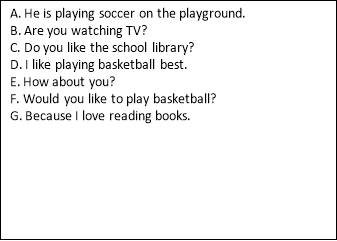In most parts of the world there are four seasons. They are spring, summer, fall and winter. In different seasons people wear different clothes and do different things. For example, in summer the weather is hot, so people usually wear cool clothes and do things like swimming, boating or surfing(冲浪). But near the polar regions(极地), there are only two seasons: winter and summer. In winter, nights are long. For more than two months(两个多月) you can’t see the sun. In summer, days are long and the sun is always in the sky. There are no nights. The people living near the North Pole(北极) are called Inuit(伊努伊特人). In summer they live in tents and catch deer for food. In winter they live in small round snow houses. They can build(建造) a snow house. They make holes(洞) in the ice and catch fish and seals(海豹). They eat much meat but not many vegetables.
1.How many seasons are there in most parts of the world?
A. Two. B. Three. C. One. D. Four.
2.In summer, people usually wear clothes and do things like swimming, boating or .
A. cool; skating B. warm; flying C. cool; surfing D. cold; flying
3.Inuit live in tents and catch for food in summer.
A. deer B. dogs C. fish D. seals
4.There are two seasons near the polar regions. They are .
A. summer and spring B. fall and winter
C. summer and winter D. summer and fall
5.Which sentence is right?
A. We can skate in summer.
B. Inuit build snow houses in winter.
C. Inuit eat little meat but many vegetables.
D. There are four seasons near the polar regions.
What must you do when you receive a present for your birthday? You have to sit down and write a thank-you note. The word “thanks” is very important. We have to use them very often. We say them when someone gives us drink, helps us to pick up things, hands us a letter or lends us a book. It is rude to ask someone to do something without saying “please”. We have to use it when we ask for something, too. It may be a book or a pencil, more rice or help. We have to use “please” to make request pleasant.
We have to learn to say “sorry”, too. When we have hurt someone, we’ll have to go up and say we’re sorry. When we have forgotten something, we will say “sorry”. We can make people forget wrong by saying it.
These three words are simple but important. Our children must learn to use them. They are pleasing words to use in any language.
1.When we receive a birthday present, we have to .
A. return it B. give it to one of our friends
C. do nothing D. write a thank-you note
2.When someone helps us to do something, we should .
A. thank him B. say sorry to him
C. use the word “please” D. not say anything
3.One of the important words in any language is “ ”.
A. hello B. yes C. no D. please
4.When we have troubled someone, we will say “ ”.
A. thanks B. sorry C. please D. hello
5.The three important words in any language are .
A. thanks, hello and goodbye B. yes, no and true
C. thanks, please and sorry D. well, please and pardon
